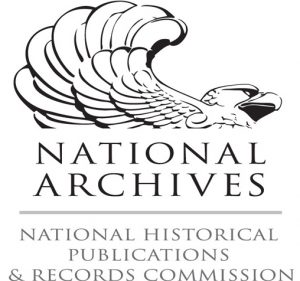Confronting the Complexities of Digital Publication: A Glimpse into the ADE Seminar on Critical Issues
By: Katie Blizzard, Communications Specialist at the Papers of George Washington and the respondent for this year’s Seminar on Critical Issues at the ADE Annual Meeting in Olympia, WA.
 In late June, numerous textual-editing scholars will travel to Olympia, Washington, to attend the Association for Documentary Editing (ADE) Annual Meeting. The three-day conference will allow these scholars to discuss the practices and challenges of editing historical documents. For the past few years, the National Historic Publications and Records Commission (NHPRC), through their grant-funded support of a seminar held during the conference, has encouraged attendees to identify and address the obstacles that prevent documentary editing from being fully accessible and sustainable. The commission’s sponsorship enables cross-disciplinary scholars to contribute to a meaningful dialogue about the critical issues facing the field.
In late June, numerous textual-editing scholars will travel to Olympia, Washington, to attend the Association for Documentary Editing (ADE) Annual Meeting. The three-day conference will allow these scholars to discuss the practices and challenges of editing historical documents. For the past few years, the National Historic Publications and Records Commission (NHPRC), through their grant-funded support of a seminar held during the conference, has encouraged attendees to identify and address the obstacles that prevent documentary editing from being fully accessible and sustainable. The commission’s sponsorship enables cross-disciplinary scholars to contribute to a meaningful dialogue about the critical issues facing the field.
This year, the ADE Seminar on Critical Issues will discuss the difficulties of digital publication of documentary editions, which can be exacerbated by limited financial and technological resources. In response to this long-standing problem, the NHPRC has partnered with the Andrew W. Mellon Foundation to launch a special program called the Digital Edition Publishing Cooperatives Initiative. This program invited scholars to assemble collaborative groups in order to search for a feasible and inclusive digital publishing solution. Eight such cooperatives were chosen to be funded, and some of them began their work as early as January 2018. Now, four leaders from these projects, as well as one of the administrators of the grant-funded program, will convene during the ADE Seminar on Critical Issues to discuss the early stages of the cooperatives’ efforts.
As the moderator of this seminar panel, I have begun to consider what insights might result from this much-needed conversation. To start, I hope to understand how the cooperatives’ characteristics—such as the institution selected for hosting, the types of materials chosen, and the individuals involved—have influenced their proposals or, in the case of the grant administrator, the preference for certain proposals over others. By exploring the needs that these solutions will address and the tools they will use, editors unaffiliated with these cooperatives will have the chance to determine whether the needs identified truly correspond to their own. Moreover, it is possible that editors will learn how the scholarly landscape—both technologically and socially—may change.
Grant guidelines required that each cooperative include a project leader, editors from at least three different projects, and a representative from the host institution. By incorporating many projects, each cooperative is tasked with the difficulty of resolving the needs and wishes of several individuals and projects at the same time. As a result, the seminar discussion will likely reflect quite a bit on the human element. And that’s a good thing. Learning about the social environments and dynamics from which these cooperatives evolved (and now seek to strengthen) will help identify how the social fabric of the field may change or solidify. It is also vital to examine how cooperative members interact with each other in order to better understand the particular nuances and sustainability of their solutions. Additionally, we can more easily confront the challenges that frequently complicate collaboration between editing projects and stymie workarounds that make cooperation successful.
One such challenge is how to reconcile the conflicting editing practices that complicate the standardization necessary to make digital editions interoperable or cross-searchable. Other conflicts, such as a lack of technological or financial capacity, may result in excluding desirable features in the final product. Discussing whether the cooperatives have had to make such choices may reveal how the field can adapt to the changing technological and funding landscapes, as well as the many ways it demands to stay the same (both because of the complexities of collaboration and the enduring desire for print publication).
Overall, I hope this conversation will forecast the trajectory of the field and encourage further dialogue between organizations about the capability of digital editions. Indeed, I hope to learn how these cooperatives will influence the field and the ways in which the project leaders envision the role of the ADE in helping these solutions unfold. These are the questions I look forward to seeing answered at this year’s ADE Seminar on Critical Issues, and I hope to see you there.
The Association for Documentary Editing (ADE) conference will be held from June 21-23 in Olympia, Wash., with the Seminar on Critical Issues scheduled for June 22 from 11:00 AM to 12:30 PM. A video recording of the seminar will be made available in the weeks following the event. For more information, visit documentaryediting.org or follow the ADE on Facebook and Twitter.